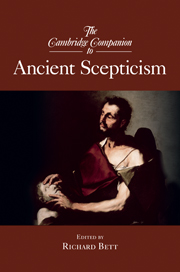Book contents
- Frontmatter
- Introduction
- Part I Origins and Development
- Part II Topics and Problems
- 7 Scepticism and belief
- 8 Scepticism and action
- 9 Scepticism and ethics
- 10 Academics versus Pyrrhonists, reconsidered
- 11 The Pyrrhonian Modes
- 12 Pyrrhonism and medicine
- 13 Pyrrhonism and the specialized sciences
- Part III Beyond Antiquity
- Bibliography
- Index
- Index Locorum
12 - Pyrrhonism and medicine
from Part II - Topics and Problems
Published online by Cambridge University Press: 28 March 2010
- Frontmatter
- Introduction
- Part I Origins and Development
- Part II Topics and Problems
- 7 Scepticism and belief
- 8 Scepticism and action
- 9 Scepticism and ethics
- 10 Academics versus Pyrrhonists, reconsidered
- 11 The Pyrrhonian Modes
- 12 Pyrrhonism and medicine
- 13 Pyrrhonism and the specialized sciences
- Part III Beyond Antiquity
- Bibliography
- Index
- Index Locorum
Summary
Sextus Empiricus, the best known to us of the Pyrrhonian sceptics and the only one whose works have survived substantially intact, was, as his name indicates, a member of the Empirical school of medicine. Other evidence also points to a close and long-sustained relation between medical Empiricism and Pyrrhonian scepticism. Diogenes Laertius' list of Pyrrhonists includes at least three Empiricists apart from Sextus himself: Menodotus, Theodas, and Sextus' student, Saturninus (9.115-16). Some of the others may also have been Empiricists, and there are figures not included on DL’s list who seem to have been members of both schools.
In his Outline of Empiricism (Subfiguratio empirica), where he adopts the point of view of an Empiricist (Deichgräber [20[ 43, 20- 22), Galen maintains that the Empiricist is to medicine as the Pyrrhonist is to the whole of life (82, 28 et seq.), and he criticizes Menodotus harshly for failing to live up to the ideal represented by Pyrrho, whom he (Menodotus himself) had held up to his fellow Empiricists as a model (84, 13 et seq.). Sextus mentions empirical forms of the arts with approval: grammar (M 1.49-53, 61); astronomy, navigation, and farming (M 5.1-2). He wrote a work on Empirical medicine (M 1.61), which is not extant, and his surviving works contain many expressions of sympathy for the Empiricists and their ideas (PH 2.246, 254; M 5.104; M 8.191, 288, 291).
- Type
- Chapter
- Information
- The Cambridge Companion to Ancient Scepticism , pp. 232 - 248Publisher: Cambridge University PressPrint publication year: 2010
- 8
- Cited by

